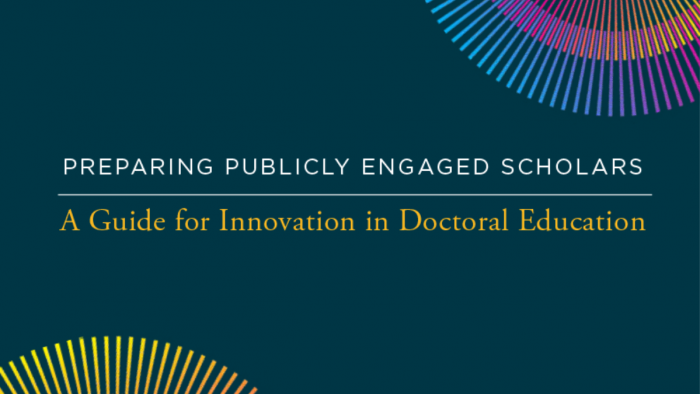

In connection with Preparing Publicly Engaged Scholars: A Guide to Innovation in Doctoral Education, the following is a list of recent resources related to public scholarship, graduate education, and tenure and promotion requirements. They include reports from the National Humanities Alliance, the American Academy of Arts and Sciences, and Imagining America, as well as guidelines from disciplinary associations and programmatic models from a range of humanistic disciplines. Thanks to Stacy Hartman for creating this list.
In addition to these, ACLS is supporting university change-makers through a quarterly newsletter, Building Blocks for a New Academy, and a listserv where you can connect with others doing this work at other institutions. To join the listserv, please email [email protected].
The following research and reports can support change-makers as they make their cases to colleagues and administrators. Many of the more quantitative reports are updated regularly, so check to be sure you are using the most current data.
We have included a few humanities disciplines here. If none of them apply to you, you can check with your discipline’s association to see what they have available. You can also use the National Science Foundation’s Survey of Earned Doctorates’ tool for conducting queries or contact the NSF to ask for their help in pulling data for particular fields.
Approaches to Training in the Public Humanities: Replicable Models for Building Public Humanities Training Programs by Michelle May-Curry and Younger Oliver, National Humanities Alliance (2023)
Graduate Education for a Thriving Humanities Ecosystem, edited by Stacy M. Hartman and Yevgenya Strakovsky (MLA 2023)
“The Future of Doctoral Education: Four Provocations for a More Just and Sustainable Academy” by Stacy M. Hartman and Bianca C. Williams (2023) in the LA Review of Books
The Community-Based PhD: Complexities and Triumphs of Conducting CBPR by Sonya Atalay and Alexandra McClearly (University of Arizona Press, 2022)
In addition to the discussion in Preparing Publicly Engaged Scholars, an overview of current recent trends can be found here: “Public Humanities Certificate Programs: Critical Scholarship for the Twenty-First Century” by Aviv Hilbig-Bokaer, writing for the Modern Language Association’s Job List (2022)
In addition to the resources below, Campus Compact, a coalition of universities and colleges dedicated to supporting higher ed’s public mission, offers a publicly-available and comprehensive repository of resources on pursuing tenure as a community-engaged scholar (2022).
Imagining America’s Scholarship in Public: Knowledge Creation and Tenure Policy in the Engaged University (2008)
Written/Unwritten: Diversity and the Hidden Truths of Tenure, edited by Patricia A. Matthew (2016)
Organization of American Historians, AHA, and National Council on Public History report and white paper, Tenure, Promotion, and the Publicly Engaged Academic Historian (2010)
The Modern Language Association’s Guidelines for Evaluating Publicly Engaged Humanities Scholarship in Language and Literature Programs (2022)
American Historical Association’s Guidelines for Broadening the Definition of Historical Scholarship (2023)
The American Anthropological Association’s Guidelines for Tenure and Promotion Review: Communicating Public Scholarship in Anthropology (2017)
University of Minnesota-Twin Cities guidelines on the assessment of community engaged scholarship
UCLA’s Center for Community Engagement’s report, Recognizing Community-Engaged Scholarship for Academic Personnel Review (2021)
The University of Wisconsin’s Morgridge Center for Public Service’s publication, How to earn tenure while doing community-engaged scholarship (Undated)
Indiana University-Purdue University Indianapolis’s Balanced Integrative DEI Case Type for Tenure Track Faculty
Oregon State University’s Tenure and Promotion Guidelines (language emphasizing DEI work added in 2015)
From the Graduate Career Consortium, ImaginePhD, a free and confidential tool for career exploration, designed specifically for humanities and social science graduate students
Stanford University’s Meaningful Work Kit, a free values-based self-assessment tool
The Modern Language Association’s Doctoral Student Career Planning: A Guide for PhD Programs and Faculty Members in English and Other Modern Languages (2018)
From the National Humanities Alliance’s Humanities for All project:
The Humanities Action Lab at Rutgers University-Newark
Anti-Racist Community Engagement: Principles and Practices, edited by Christina Santana, Roopika Risam, Aldo Garcia-Guevara, Joseph Krupczynski, Cynthia Lynch, John Reiff, Cindy Vincent and Elaine Ward (2023)
The Humanities in American Life: Transforming the Relationship with the Public, edited by Carin Berkowitz, Norman Marshall Bradburn, and Robert B. Townsend (special issue of Daedalus, Summer 2022)
Public Scholarship in Literary Studies, edited by Rachel Arteaga and Rosemary Erickson Johnson (2021)
“A Profile for Public Musicology” by Drew Massey in Musicology Now from the American Musicological Society (2015)
“The Insular World of Academic Research” by Karen Fischer in Chronicle of Higher Ed (2023)